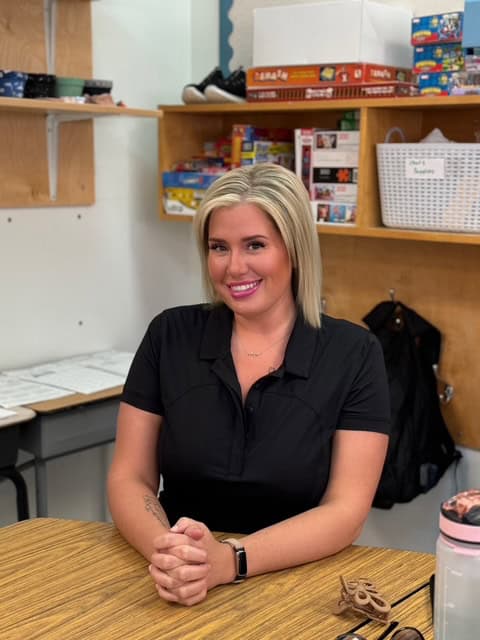
Cortni Engler has paved the way as the very first provincial volunteer based outside of Edmonton in a CASA program – CASA Classrooms.
Before Cortni, CASA volunteers were based in Edmonton. However, with CASA expanding provincially, the organization was already looking to expand its volunteer base. You could say it was a case of perfect timing.
Cortni, a psychology student at Red Deer Polytechnic, wanted to find a volunteer position that could help her decide if becoming a child psychologist was right for her. That’s how she discovered CASA Mental Health.
She applied to volunteer at CASA in June 2024, and became actively involved. She volunteered to sell 50-50 tickets at a Sylvan Lake Gulls game to support CASA, and volunteered at CASA’s golf tournaments in Red Deer and Edmonton.
In fall 2024, one of her classes included a community service learning component, requiring hands-on experience. Cortni contacted CASA’s volunteer manager and asked if there might be an opportunity to volunteer at the CASA Classroom in her community – the Escuela Vista Grande School in Red Deer for Grade 6 to 8 students. Together, CASA Classrooms leaders, CASA’s volunteer manager and Cortni collaborated to envision and build this new volunteer position.
Currently, Cortni volunteers in the classroom between seven and 10 hours a week. Typical duties include support with literacy and numeracy, emotional regulation, student supervision during activities and classroom preparation. Cortni’s course is long over, but she intends to continue volunteering in the classroom as long as she can.
Plans are already underway to expand volunteer resource support into other CASA Classrooms, potentially throughout the province.
Why do you volunteer at CASA?
I have a sister who struggles with mental health and addiction. She has since she was 14 years old. She’s now 24. It’s been over a decade, and she’s still struggling and not sober. At the time when she was really young, our family had no supports. There wasn’t anything around to help her. And I feel like we would have benefitted from some intervention or some support with how to deal with addiction or mental illness. It made me emotional when I was first hearing about the CASA Classroom. I wish we’d had something like that.
What’s a day in the life like when you’re volunteering in the CASA Classroom?
While the schedule changes day-to-day, it generally includes a mix of regular academic studies and various therapeutic interventions. For example, when I start — usually around lunchtime — I help with outside supervision after the students finish eating. When they come back inside, they typically move into study time — activities like journalling, DEAR (Drop Everything and Read), English and so on. I stay available to support wherever needed, whether that’s helping them brainstorm ideas or making them feel more comfortable with their tasks. Throughout the day, students are pulled for individual therapy sessions, and it’s really inspiring to see how a student who may have been having a hard time can come back to the classroom feeling more confident and ready to take on their work. I stay available throughout the day to support wherever I’m needed — whether that’s being someone they can talk to, helping with their studies or spending one-on-one time with a student who might need to work through something separately from the class.
How do you juggle being a student, parent and volunteer?
It is a lot, for sure, being a full-time student and a full-time mom. My kids are four and six and still require a lot of involvement. I’ve been able to make it work because CASA has allowed me to do so. That’s one of the things that drew me to CASA. It’s very flexible. There aren’t hourly requirements every week. I think it comes back to CASA really appreciating volunteers and their time. I’m able to integrate it in a way that works for me and my family, so I’m still here to grab my kids from school and spend the evenings with them. I don’t feel I have to sacrifice anything from any area of my life. It fits really well.
How do you take care of your own mental health?
I have a therapist I see every month. I go to therapy regularly, which I find really, really helps, but I also try to focus on recharging my own batteries. I do have a lot on the go, but I do make time to do the things that bring me joy. Even if I am really busy, I do still go to the classroom because I know it’ll make me feel better. And I do lots of things with my girls that we love, like golfing together.
Anything else you’d like to add?
I feel like I’m going to sound like an industry plant, like I was paid to do this, but truly I genuinely enjoy it. I think it’s really cool and if people can see that it can fit into their schedule and lives and be something they get a lot of value from, that’s so important. This whole journey with CASA has really reconfirmed for me that I’m on the right path and it makes it feel like all that time I’m spending and the work I’m putting in is so worth it because I know I’m doing something I love. And how cool that I get to be doing it while I’m getting there. I get to be doing what I love and experiencing this while I’m working towards that. I’m so lucky to be able to do that.
For more information on becoming a CASA volunteer like Cortni, visit casamentalhealth.org/volunteer.